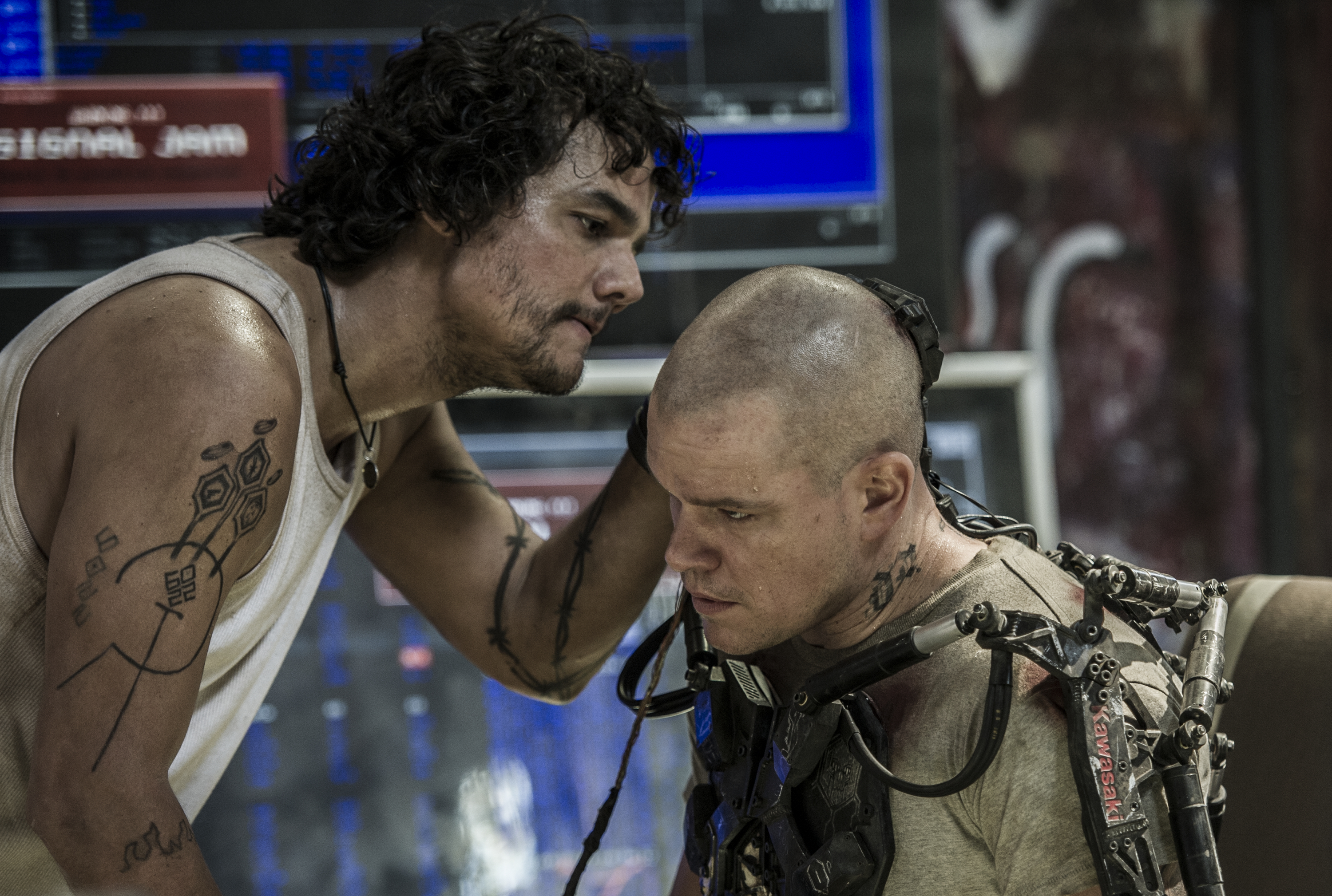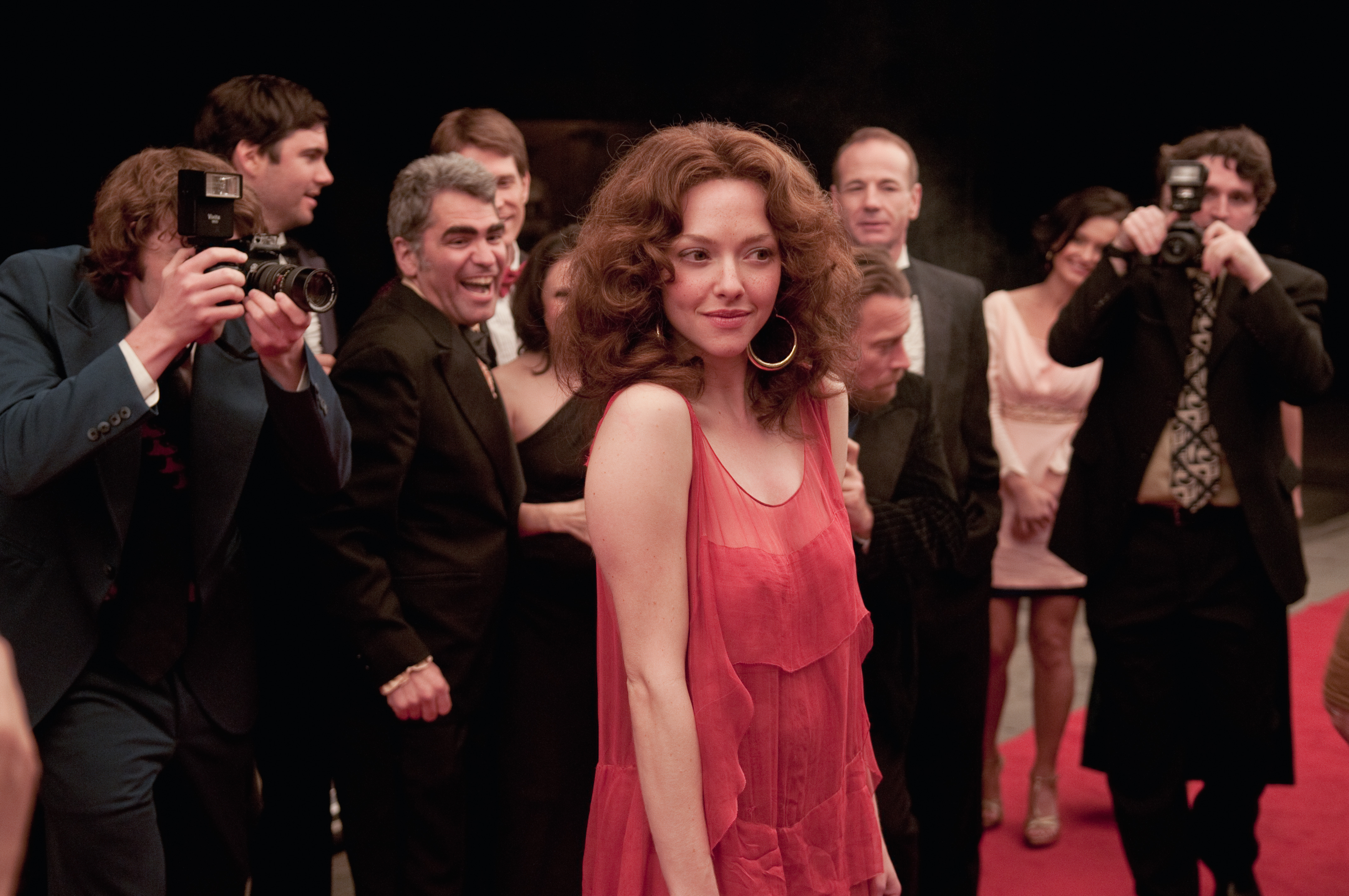Andre Gregory: Before and After Dinner
runs Fri., Aug. 9–Thurs., Aug. 15 at Northwest Film Forum. Not rated. 101 minutes.
Running this week with 1981’s My Dinner With Andre, this new documentary profile is an unabashed family affair, as its director frankly admits—she’s Andre Gregory’s second wife. Cindy Kleine married the much older widower late in his career as an avant-garde theater director and occasional actor. (There are a few snippets from My Dinner with Wallace Shawn, plus odd resume entries like Demolition Man.) Her breezy account of their courtship is candid and funny, but she also has serious work to do—a biographical and career overview of her husband, now 79 and a recent cancer survivor.
Not covered in this doc is Gregory’s much-praised new revival of Shawn’s The Designated Mourner. Instead we see intimate rehearsal scenes of Ibsen’s The Master Builder, apparently conducted in his home, a 14-year collaboration with Shawn that Jonathan Demme just filmed. (Yes that’s Julie Hagerty on the couch, running through her lines.) Gregory is famously all about process, and his rehearsals can stretch for months and years. “His basic technique is to follow your impulses,” says Shawn, a fond colleague of four decades. Gregory is also frank about his fulsome, communal art-making being a response to a cold if privileged upbringing. His family escaped Hitler in the ’30s, fortune intact, but there are ugly rumors to address here that his father was also a Nazi collaborator.
Old clips show Gregory’s evolution from ’60s fringe artist to a figure now revered by family, friends, colleagues, and us filmgoers who know him through basically one movie. Of course, he and Shawn were playing parts back then, almost caricatures of themselves. Today, Gregory’s sage pronouncements and enthusiasms—for shamans, nudity, etc.—have a well-practiced polish. (He’s not quite a James Lipton–like figure of self-parody, but in the same room.) Kleine’s portrait never resolves into something so finely honed, but it’s moving and well-timed, a fitting aperitif to a certain favorite Dinner. Brian Miller
Blue Jasmine
Opens Fri., Aug. 9 at Harvard Exit and Sundance Cinemas. Rated PG-13. 98 minutes.
Woody Allen is no stranger to messing with the classics. Play It Again, Sam made a comedy of Casablanca. Love and Death played Tolstoy for laughs. His short story “The Kugelmass Episode” even appropriates the figure of Emma Bovary. And all those efforts worked, in part because the author was reaching up to his artistic gods. He was kidding, a little nebbish on the sidelines. Yet there’s nothing comic about the downfall of Blanche DuBois in A Streetcar Named Desire, the inspiration for Blue Jasmine. Significantly, nowhere in the film’s ads or press notes is it called a comedy, though it earns many chuckles. And for the first time in his series of historical mashups, the 78-year-old director actually seems like the senior partner, Tennessee Williams being his near contemporary—not part of a distant pantheon. All of which makes Blue Jasmine an awkward mismatch of pathos and ridicule, less fusion than simple borrowing.
Grafted onto the story of delusional trophy wife Jasmine (Cate Blanchett) is a Madoff-like fable of the recent financial crisis. In flashback, we see her husband (Alec Baldwin) buying her consent with luxury while he swindles the Montauk set. What did Jasmine know of all those trusts and LLCs in her name? Allen leaves that for late in the film to resolve. By that time, she’s broke and living with her sister Ginger (Sally Hawkins) in a shabby San Francisco apartment. Jasmine is a snob who needs to be brought low, a task relished by Ginger, her boyfriend (Bobby Cannavale), and her ex (a surprisingly sympathetic Andrew Dice Clay), the truth-teller of the piece. Of Jasmine’s past deeds, which likely ruined his marriage to Ginger, he says, “Some people, they don’t put things behind so easily.” But Jasmine prefers the self-induced amnesia of Xanax and vodka. Though she eventually admits to being a class-climber, having ditched her birth name (Jeanette) and blue-collar family.
As Blue Jasmine toggles between Jasmine’s gilded past and fallen present, you wonder about Allen’s own class anxieties. Born a Brooklyn nobody, living on Fifth Avenue today, he rubs shoulders with the likes of Madoff and his duped investors. Yet he clearly sides with Ginger and her two Stanley Kowalskis. Ginger may make bad choices about men (Louis CK is another), but she’s honest about her mistakes, unlike Jasmine. That the two sisters were both adopted brings an odd genetic twist to the story—but like everything else in the script, Allen never develops those notions. As with Baz Luhrmann’s recent The Great Gatsby, you sense that Allen wants to say something about our present culture of inequality and fraud, but he only dabbles, never probes.
Blanchett has played Blanche before, and she’s very good with her character’s fragile obliviousness. Yet perhaps because that character isn’t entirely Allen’s creation, he doesn’t finally know what to do with her. Jasmine is more foolish than evil, but there’s nothing funny about her final punishment. Brian Miller
PDrug War
runs Fri., Aug. 9–Thurs., Aug. 22 at SIFF Cinema Uptown. Not rated. 107 minutes.
Johnnie To is more than an action director—his resume includes hit comedies, romances, and social dramas. But as the crime-movie king of Asian cinema, he is the most rigorous and disciplined of Hong Kong action stylists. So far he’s resisted the siren call of Hollywood, but with Drug War he’s made his first crime thriller in mainland China. He trades the overcrowding and overheated capitalism of Hong Kong for the open plains and lonely highways of Tianjin, yet Drug War is still a classic cop procedural. His trademark police squad is lead by the tough, serious, unflinching Inspector Zhang (Chinese star Sun Honglei, all humorless efficiency), whose team executes his every order without hesitation.
Drug War begins with a police stakeout for drug mules at a border crossing, which yields a once-in-a-lifetime shot at the crime kingpins thanks to a remarkably accommodating informant named Choi (To regular Louis Koo, sweaty with mercenary self-interest). The whole police scheme is improvised on the fly. Zhang proves a crack mimic as he goes undercover on a minute’s notice, and his team fights exhaustion as the mission stretches through long days and sleepless nights. To keeps track of all the moving parts with remarkable clarity, even when Zhang’s plan spins violently out of control. Despite these complications, To keeps things moving at a breathless pace.
Forget the canned quips and manufactured personality quirks of American cop movies. These Chinese officers are earnest, intent young men and women, while the drug kingpins resemble financial moguls, far removed from the street. The grit in the gears of their financial machinery comes from the thugs on the lowest rungs of the drug enterprise—and those lackeys are almost endearing for their unpredictability and idiosyncrasies, though with a sociopathic edge.
To streamlines police-procedural and action-movie conventions here to near perfection. Apart from some talk of China’s death penalty for meth dealers, the only politics in Drug War consist of power and loyalty. The rest is the pitiless physics of momentum and gunfire, and it is impressive. Sean Axmaker
Elysium
Opens Fri., Aug. 9 at Cinerama and other theaters. Rated R. 102 minutes.
Elysium hangs in orbit, a giant spinning space station of deluxe McMansions and WASPy country clubs; it’s a brief supersonic ride from the filthy, overpopulated Earth of 2154.
Elysium looks like the most boring place imaginable. But every home has a healing machine (like the auto-surgery modules in Prometheus), which is handy if one has absorbed a lethal dose of radiation and has five days to live. In Neill Blomkamp’s Elysium, such is the dilemma of Max (Matt Damon), a worker-drone on Earth who must find a way to get to Elysium and fix his decaying body.
Already you can see the outlines of Blomkamp’s allegory, a world divided between the haves and the have-nots (such a remarkably consistent vision in futuristic fiction, from H.G. Wells’ The Time Machine through Metropolis and Avatar). If this lacks the startling originality of Blomkamp’s 2009 District 9, which shredded the imagery of apartheid in Blomkamp’s native South Africa through a savage and funny alien-invasion scenario, the Elysium setup is still workable enough to qualify as satisfying old-school science fiction.
The orbital Elysium is so brilliantly visualized, Blomkamp might’ve benefited from exploiting it more—at least for satirical points. Most of the time we’re on Earth, in a Los Angeles that resembles Mexico City (where some of the scenes were shot) by way of The Road Warrior. We barely get to know Max before he gets dosed, although his yearning for a childhood sweetheart (Alice Braga, from I Am Legend and City of God) and his wayward past are enough to locate him in the tradition of the lone rider—so much of sci-fi still derives from the Western. The simplicity of the setup—oh, Elysium can be rebooted by flipping a switch? All right . . . —doesn’t need to be a detriment; some science fiction works because the basic ideas allow for wild visions and imaginings. On that score, Elysium, like the recent Oblivion, succeeds firmly but not extravagantly. You won’t be humming its set design in your mind on the way home.
Blomkamp hasn’t arrived as a director of actors yet, either. The old pros are fine: Damon knows exactly how to lock Max into focus; Jodie Foster (leading with clenched jaw) is on point as the Elysium security chief; and William Fichtner is scrupulous as a corporate jerk. But Brazilian actor Wagner Moura, of Elite Squad fame, is all over the place—and sometimes unintelligible—as a grungy crime boss, and Sharlto Copley periodically hijacks the movie as a loathsome corporate mercenary patrolling L.A. Copley, an unexpected delight in District 9, is all gunky beard and taunting accent here. He’s fun to watch, yet his character drags Elysium into the 21st-century action model, which is exactly the wrong direction. I enjoyed the film, but Blomkamp leaves too much hanging in orbit. Robert Horton
Europa Report
Opens Fri., Aug. 9 at Varsity. Rated PG-13. 90 minutes.
Again, space is having its moment. The WALL•E-esque Mars rover Curiosity is a celebrity, as is Canadian astronaut Chris Hadfield for his “Space Oddity” cover from orbit. Again there’s talk of a manned mission to Mars, a new moon base, or any such NASA spending that would provide red-state jobs. In that context, this thrifty little sci-fi picture is both topical and deeply underwhelming. A private European space consortium has launched a probe to Europa, one of Jupiter’s moons, where there’s ice, heat, and the possibility of algae. Life, in other words. The multinational crew of six leaves in 2011. It takes almost two years to reach Europa. En route, however, communication is lost, and the astronauts are feared dead.
Using multiple cameras, split screens, and one large set for the spacecraft interior, Europa Report gets the look and tedium right for more than 20 months of claustrophobic space travel that could end with the discovery of . . . precisely nothing. (If no life is found, the crew rationalize, it’s all part of the scientific process. Some consolation.) As a date-clicker shows the passing weeks and months, however, the galactic quotidian suddenly goes out of sequence. The story skips forward and back, with interviews among the scientists on Earth, the pre-launch press conferences, and past-tense analysis that sounds like post-mortem. Then you realize Europa Report is one of those fake found-footage exercises like The Blair Witch Project. Something bad has happened on the journey, and the movie delays those video revelations for as long as possible.
Unfortunately, that structure doesn’t work. The Earth experts deliver much boring exposition. The space crew’s petty tensions—among four men and two women—aren’t compelling. And the crucial plot turns, like the disappearance of one astronaut, are disguised by the same gimmicky, withholding editing that ruins the entire film. A fateful trip outside the capsule only makes us anticipate Alfonso Cuaron’s Gravity, due in October, with George Clooney and Sandra Bullock.
Written by Phil Gelatt and directed by Sebastian Cordero, Europa Report starts with a pleasing modesty, unlike the space operas of Cameron, Scott, or Lucas. Still, when an astronaut says of Europa’s ice-covered oceans, “This is a much more complex ecosystem than we previously thought,” we expect monsters, we expect The Twilight Zone. Using cheaper budgets and primitive technology, that old show achieved better results than anything seen here. Brian Miller
Lovelace
Opens Fri., Aug. 9 at Pacific Place. Rated R. 92 minutes.
Released in 1972, Deep Throat is a cultural event far removed from our present, plentiful era of cyberporn. Arriving after the Pill and sexual revolution and before AIDS, it occupies a weird, creepy realm of boomer nostalgia. Its unhappy star wrote a tell-all in 1980 (the main basis for this drama), and there was a more recent documentary, Inside Deep Throat, in 2005. So what if anything are we to learn from her sad story today?
Linda Boreman (Amanda Seyfried), 21 years old, is still living with her dour, conservative parents (Sharon Stone and Robert Patrick). At a South Florida roller disco she meets Chuck Traynor (Peter Sarsgaard), a parking-lot Prince Charming who drives a Mustang and runs with a fast crowd. He’s vague about his job, but he hosts wild parties with pot, a little coke, and stag movies, so she marries him. Anything to get away from Mom and Dad, to rebel. But Chuck needs money, so he talks her into doing a blue movie. “I just don’t want to disappoint anybody,” says Linda, ever the people-pleaser.
We know the rest of the story, and that’s the dilemma for directors Rob Epstein and Jeffrey Friedman (best known for their documentary The Celluloid Closet) and screenwriter Andy Bellin. The filmmakers certainly get the Nixon era’s look right, from Chuck’s bell-bottomed sleaze to the polyester shirts of Deep Throat’s shady producers (Hank Azaria, Bobby Cannavale, and Chris Noth). When Chuck finally beds Linda, he cues up “Fooled Around and Fell in Love” on his reel-to-reel. Classy. As Linda’s censorious mother Dorothy, a deglamorized Stone wears her waitress uniform with tired authority; she works on her feet and resents Linda’s working on her knees. And there are snippets of Cronkite and Carson on TV—our little girl is suddenly famous, the object of snickering, lecherous fascination. (Here comes the James Franco cameo as Hugh Hefner, confusing smarm with gravitas.) While all the period details resonate, they never congeal into a story that’s in any way novel or interesting.
Part of Deep Throat’s success, Epstein and Friedman seem to be arguing, was that it contained enough humor, and a sympathetic heroine, to make it a date flick for swingers—not just a solo wank-movie. Yet Lovelace never sorts out Linda’s exploitation from the taboo-breaking phenomenon of Deep Throat. Or its legacy. And the victim’s side of any story, alone, is seldom very dramatic. In the postscript we learn that after Linda fled Chuck, he found a new wife to mooch off—porn star Marilyn Chambers. Even if Linda got out of the biz, eventually finding happiness as a mother and housewife, that biz continues on a vastly larger scale today. And there is always a new Linda at the bus stop, waiting for a new Chuck. Brian Miller
We’re the Millers
Opens Wed., Aug 7 at Sundance and other theaters. Rated R. 109 minutes.
Jennifer Aniston gives every indication, onscreen and off, of being a hardworking and good-natured person; alas, her utter niceness has led to a dire series of post-Friends vehicles, films in which her capricious comic timing is squandered on very watered-down material.
Every now and then one of these movies tries to add some “edge,” which must be welcome to an actress stuck in the America’s Sweetheart loop. With the notable exception of The Good Girl, these attempts only remind us how nice Aniston is and how far short she falls of such knotted-up characters. Case in point: We’re the Millers, a predictably raunchy comedy with a farfetched but not impossible premise: Drug dealer David (Saturday Night Live veteran Jason Sudeikis) must make good a debt to his slick supplier (Ed Helms) by bringing a huge load of marijuana across the border from Mexico. David’s idea: Hire three strangers to pretend to be his nauseatingly clean-cut family, the better to escape detection while driving through customs in a motor home.
Aniston plays a stripper. So this is one of those “edge” parts, I guess. Her character, Rose, is strapped for cash and agrees to play David’s wife during the drug run—so not only is Aniston playing a cynical, wised-up stripper, she’s also playing the goody-two-shoes masquerade on top of that, which is supposed to be funny because we see the cynical stripper beneath the chirpy surface. Except we don’t, because what we see is Jennifer Aniston.
I was rooting for Aniston during the film, just as you hope that anybody caught in a trap will find the key. Game as she is, the worst moments are the strip scenes, when Rose goes down to her undies (there’s no nudity from Jennifer Aniston, unlike certain other actresses we could mention whose names rhyme with Angelina Jolie). The performance is awkward and unconvincing, as though Aniston knows she’s not getting away with it. She has top billing, but the story is told from David’s perspective (it might have been a crazier movie from Rose’s point of view). The faux-marrieds take in two teenage kids to play their children; they’re played by Emma Roberts and Will Poulter, the latter a red-headed English lad who stood out in the last Chronicles of Narnia movie and will undoubtedly get a lot of work from his funny turn here.
For all the shock jokes and shady subject matter, We’re the Millers is just another soft-centered comedy, relying on improvised doodads for its biggest yuks. Nothing kills a laugh like feeling bad for a performer—and you will feel bad for Jennifer Aniston here. Robert Horton
E
film@seattleweekly.com







